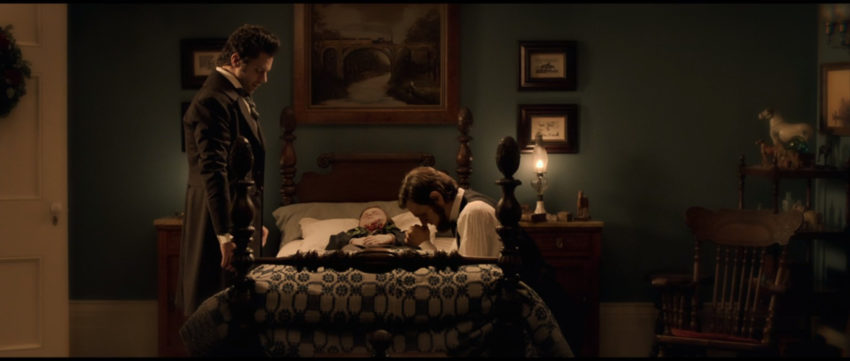
I don’t make it a point of pride to hate actors. If I don’t like someone’s acting, I generally keep it to myself. I much prefer to talk about things I love, and I always want to be surprised by things I thought I didn’t or wouldn’t like. But, until a few weeks ago, I was pretty sure that British actor Dominic Cooper was never going to surprise me. I had entirely written him off as not my cup of tea, and I was fine with that.
My sister and I used to call Dominic Cooper “Frog Man.” We first saw him as Willoughby in the 2008 miniseries adaptation of Sense and Sensibility, and we immediately hated him. In all fairness, by the end of Sense and Sensibility you’re supposed to hate Willoughby, but my sister and I specifically hated Dominic Cooper as Willoughby. We were teenagers, and we were judgemental. “Who would swoon over that baby-faced, bug-eyed guy?” we wondered. My mom, who watched the miniseries with us, agreed that he was no Greg Wise.* We incredulously marveled at the awfulness of Cooper’s shallow bad boy act.
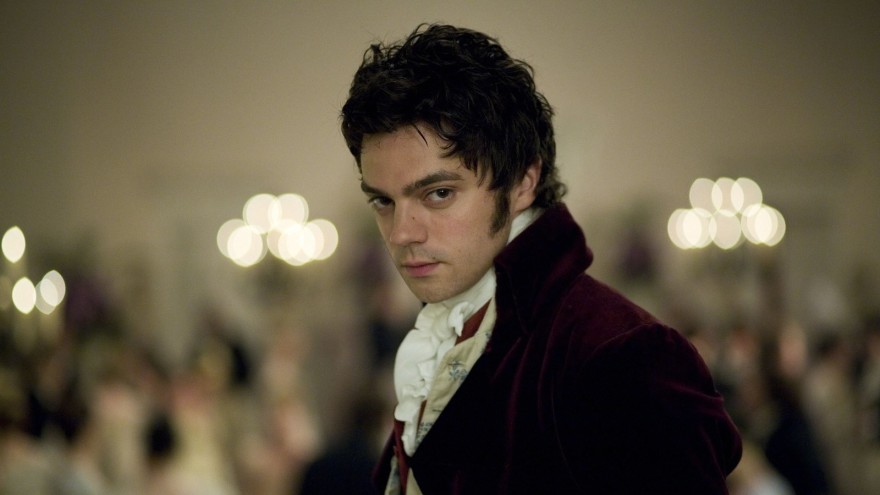
That was in the spring, and by the end of the year, my sister and I had been subjected to two more films where it was clear that we were supposed to find Dominic Cooper hot and sexy. Summer brought Mama Mia!, in which Cooper’s main number finds him cavorting shirtless around the beach. For the sake of transparency, I’ll admit that I viscerally disliked all of Mama Mia!, but Cooper failed to impress once again.** In the fall, Frog Man showed up in The Duchess, this time as Keira Knightley’s one-true-lover. I don’t recall him setting the screen on fire in that one, either. I haven’t seen The Duchess since it came out, but the fact that Roger Ebert’s very positive review of the film doesn’t mention Dominic Cooper by name in the main text at all seems to reaffirm my initial opinion.
2008 set the tone, and Cooper never recovered in my estimation. Until a few weeks ago, I had yet to see Cooper in a film where I was picking up the sexual charisma that he was ostensibly putting down. And it seems that he’s always cast in roles where he’s supposed to be sexy. There’s clearly something about the man; in real life, he’s dated two of his gorgeous co-stars (Amanda Seyfried and Ruth Negga), and he’s currently reportedly linked with Gemma Chan. Until a few weeks ago, I just never saw that something on screen. Until a few weeks ago, I still thought about him as Frog Man, wannabe sex symbol and sometime Howard Stark.
A few weeks ago, I watched Abraham Lincoln: Vampire Hunter on a whim.
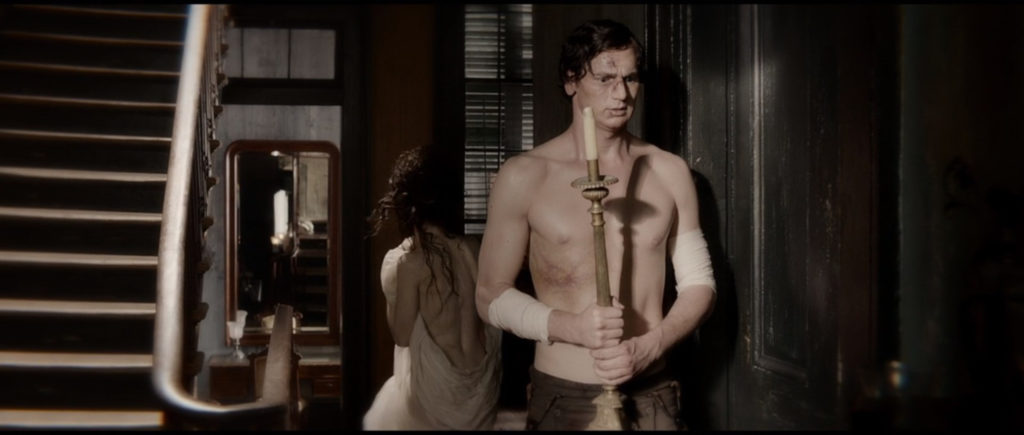
The 2012 action/horror film, based on Seth Grahame-Smith’s popular novel of the same name, pits our nation’s sixteenth president against the slave-owning vampire ring that runs the antebellum American South. I mean, it’s all there in the title. The film got mostly bad reviews and did poorly at the summer box office, and I, too, skipped it when it was in theaters. I’m going to be honest with you, I had pretty much forgotten that this movie existed until it popped up on the HBO Max homepage a couple of months ago.
I vaguely remembered that the film had briefly been on my radar because of Benjamin Walker. Fresh off of the unsuccessful Broadway run of the rock musical Bloody Bloody Andrew Jackson, in which he played the titular role, Walker signed on to play the lead in Abraham Lincoln: Vampire Hunter. If it’s possible to be typecast as something so particular, it seemed for a time that Walker might make a career out of portraying outrageous versions of nineteenth-century American presidents. The actor brought Andrew Jackson to life on-stage as a hot, emo rock star—to, it should be said, scathingly satirical effect—so, naturally, Walker seemed like a fun fit for a cool, vamp-slaying version of Abe Lincoln.
I realize that I throw around the word “obsessed” very liberally on this blog, but I am well and truly obsessed with Bloody Bloody Andrew Jackson. If you aren’t familiar with the show, this song will give you a taste of what the whole thing entails. (Popula-jizz-m!)*** I could absolutely talk about this musical for far too long if you let me, but I’ll spare you. I only mention it to say that when I decided to watch Abraham Lincoln: Vampire Hunter last month, I did so mostly out of affection for Ben. And, of course, an urgent desire to turn off my brain for a couple of hours.
In truth, the cast of this ridiculous movie is stacked with charismatic actors. In addition to Walker, we’ve got Mary Elizabeth Winstead, Anthony Mackie, Jimmi Simpson, and Rufus Sewell—none of them A-list stars, but all of them reliable scene-stealers. Not one of them shines in this film, though. The odd but, I would argue, ultimately successful tone of the movie requires everyone involved to play it straight as can be, almost to the point of being deadpan.
I admire director Timur Bekmambetov’s instinct to forgo a self-aware tone and easy jokes in favor of poker-faced seriousness. (Based on his filmography, I’m not sure that Bekmambetov is capable of making anything that doesn’t take itself seriously. But I suppose this inability is what made him the right choice for Abraham Lincoln: Vampire Hunter.) There are few things worse than a film that transparently wants to be a cult-classic midnight-movie and winks at you about it every five minutes. Abraham Lincoln: Vampire Hunter works best when the ludicrous premise plays out in the most straightforward manner. For instance, the final action set piece, where Abe Lincoln simply kills a bunch of vampires on top of a train, plays like gangbusters.
In a way, Walker has the easiest job. To make good on the juicy promise of the film’s title and get a reaction out of the audience, all he has to do is be tall, look grave, and axe murder vampires while wearing a top hat. The bizarre visual of Abe Lincoln’s iconic physique engaged in battle with a bloodsucking monster doesn’t need embellishment. Weirdly, it helps that the totally freaky prosthetics Walker sports in the back half of the movie make it look like the actor is literally wearing Lincoln’s dead face as a mask. Most of the supporting characters, however, aren’t given material outlandish enough for the juxtaposition between affectless performance and fantastical action to work nearly as well. This movie is Lincoln-sploitation, and for the most part it doesn’t know what to do with the characters who aren’t Lincoln.****
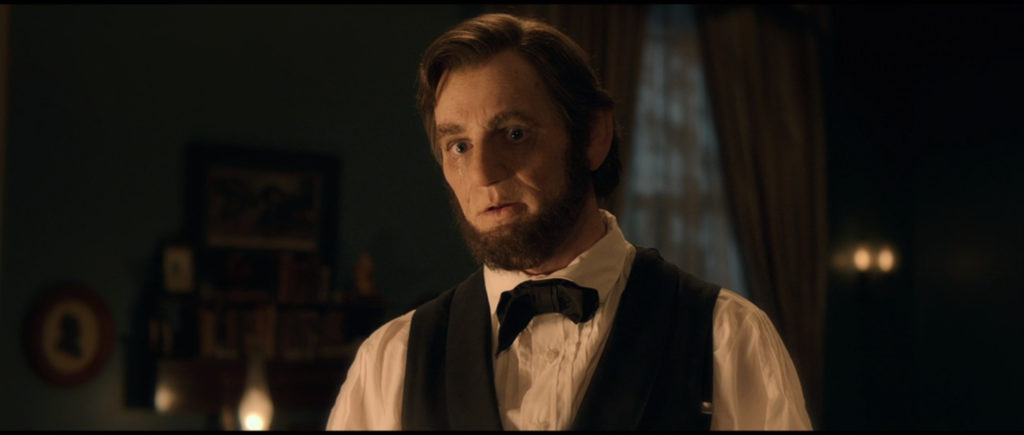
But one actor in the film operates in a slightly different register from the rest of the cast and stands out for it: Dominic Cooper, the one and only. I had no idea that he was in Abraham Lincoln: Vampire Hunter when I put on the film, so it was a genuine surprise when he popped up. About ten minutes into the movie, young Abe decides that he’s going to get revenge on the man/vampire who killed his mother when he was a child. Abe goes to a bar for some liquid courage, and Dominic sidles up to him as he’s drinking. “A boy only gets that drunk when he wants to kiss a girl or kill a man,” Dominic quips before slapping Abe on the back, knocking a gun out of his coat and confirming which it is. With that, we’ve been introduced to Henry Sturges, the mysterious man who eventually educates Abe about the world of vampires and trains him in the art of slaying the undead.
Here I must note that Abraham Lincoln: Vampire Hunter is vampire-sploitation as much as it is Lincoln-sploitation; we all remember the years when every publisher and every producer was trying to replicate the lightning-in-a-bottle success of Twilight. Just as Seth Grahame-Smith’s previous book, the wildly successful Pride and Prejudice and Zombies, was a mashup, so is Abraham Lincoln, Vampire Hunter (the source novel). It’s Buffy the Vampire Slayer meets Dear America—or any other diary-format historical fiction, take your pick. Lincoln is the vampire slayer, obviously, and the Southern vamps are the unequivocally monstrous enemies that Lincoln must vanquish. [Light spoilers follow, if you’re worried about that sort of thing.] Henry Sturges is our Angel, our Edward Cullen, our sexy, good-guy vampire that the genre requires.
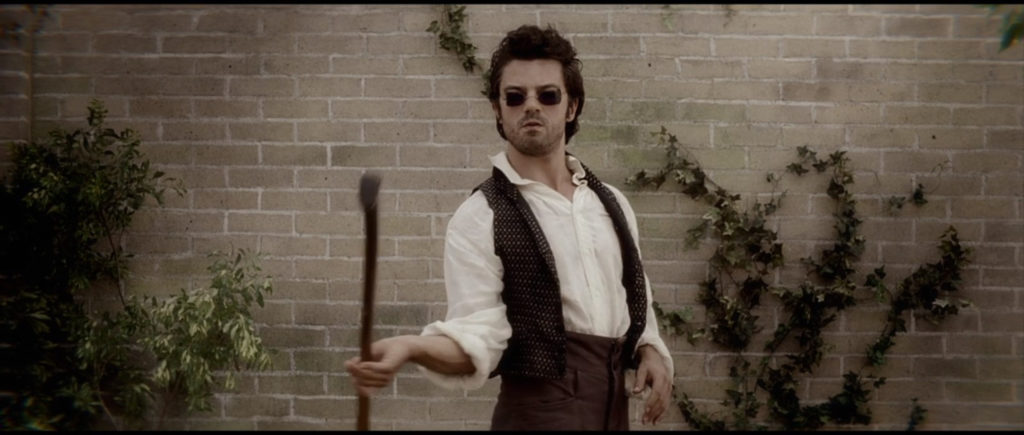
I was startled when Frog Man showed up in the film and didn’t immediately prompt an eye roll. I was flat out shocked when he single handedly stole the whole show. Dominic Cooper, it turns out, was born to play a sexy, good-guy vampire.
Cooper’s screen persona is intensely tied to an artificial sort of over-the-top sensuality which I have previously found uncompelling. In calling the actor’s allure artificial, I mean to say that the come-on is clearly put on; he’s laboring to seduce you. That’s not necessarily a bad thing in and of itself, I want to clarify. Glamour and performative desirability are often part and parcel of being a movie star. But I had always felt that Cooper lays it on too thick, to a “dost-thou-protest-too-much” effect. That is, he works so hard to convince everyone of his hotness that I just had to assume he’s not actually that hot.
Unexpectedly, everything that normally registers as “too much” about Cooper’s mannered approach to exuding sex appeal—the pouty lips, the intense stares, the carefully mussed hair, the insistence on appearing shirtless in every one of his films—hits precisely the right note in Abraham Lincoln: Vampire Hunter. It all comes together flawlessly. It only took a film where Cooper plays a vampire for me to finally understand his appeal.
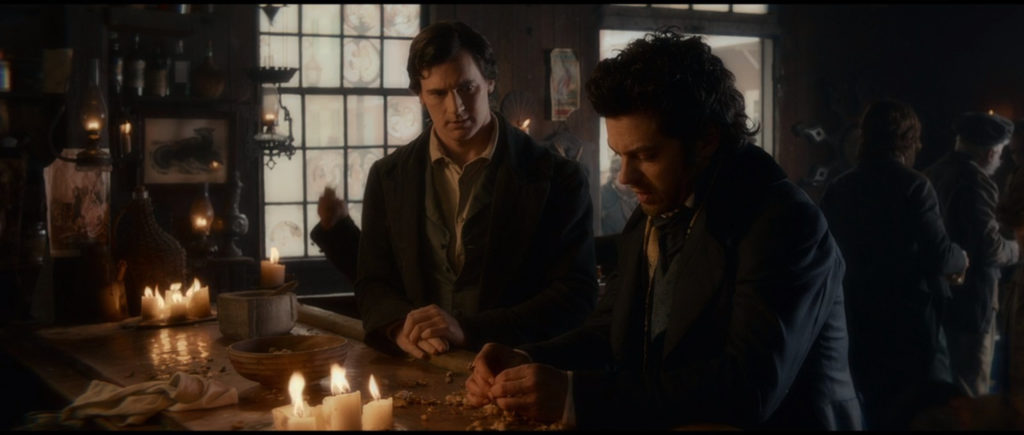
Henry Sturges is Cooper “playing it straight,” in so far as Cooper always acts like a vampire. (Aha! A revelation.) In this way, the casting is brilliant. Cooper doesn’t ham it up in a way that contradicts the self-serious tone of the film, but his usual modus operandi is already rather exaggerated. I don’t think he could be legitimately deadpan if he tried, and that turns out to be for the best. The dynamics of this film only work if, as previously discussed, stony Abe has something spectacular to contrast with. In the action scenes, that’s the horrible Southern vampires. For the rest of the film, it’s Sturges’s sexy, good-guy vampire bit.
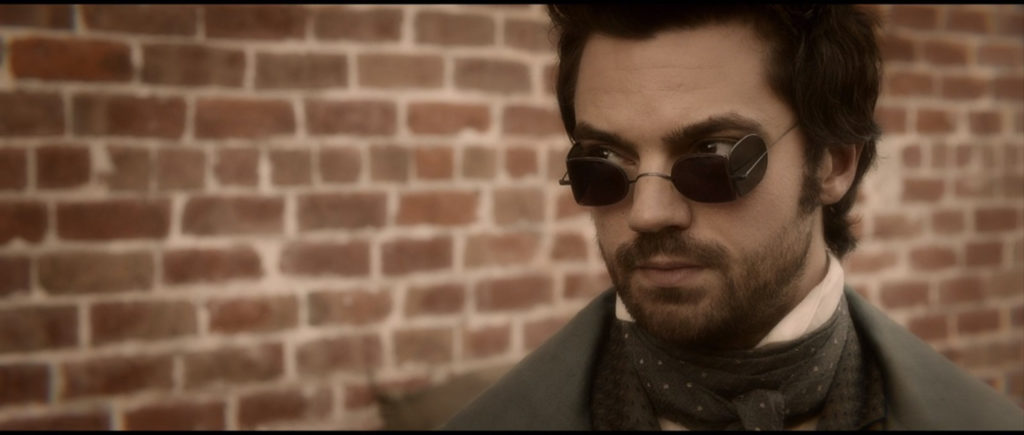
And Abraham Lincoln: Vampire Hunter really fires on all cylinders during the scenes shared by Abe and Henry, because in the context of this otherwise icy affair, Cooper’s charisma is indeed spectacular. While it’s not revealed until partway through the movie that Sturges is a vampire himself, Cooper’s performance should tip off any observant viewer. He prowls around in the shadows, he entertains lady friends in an empty bathtub (in the middle of his living room in his clearly haunted house), he smolders over the top of teeny-tiny sunglasses. And there’s something so, well, vampire-y about the way Cooper strives to be seductive in all of his roles. He’s trying so hard it’s like he wants something from you (your blood). Cooper’s not menacing enough to be a villainous vampire, but the sexy, good-guy vampire is such a natural fit for him that I can’t believe he played a human in Dracula Untold. What a waste.
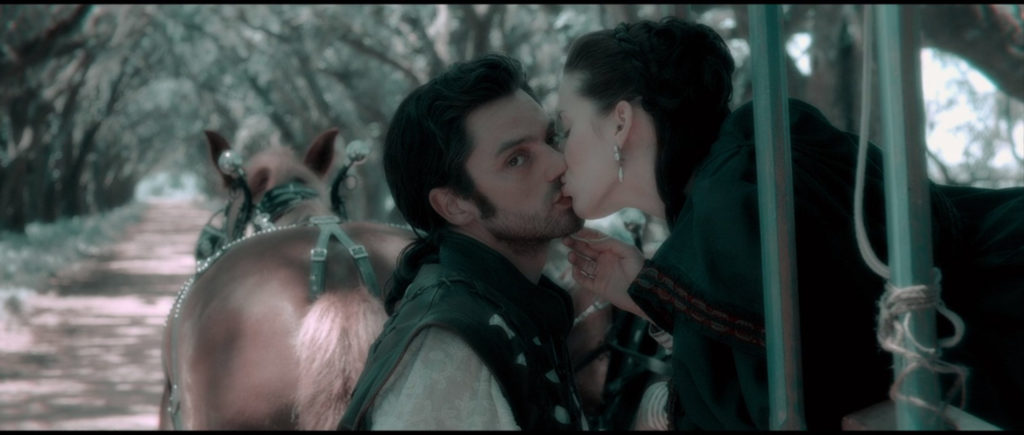
I have to admit that willingness to be seduced may have a lot to do with what works for me about Henry Sturges. I love sci-fi/fantasy fiction, and I’m a sucker for sexy vampire tropes. While I normally find Cooper’s style excessive and off-putting, it’s perfect when he’s a vampire. Sexy vampires are excessive, verging on obscene, and, honestly, a little silly. I dig it. Where vampires are concerned, the more licentious, the better; and Cooper’s performance as Sturges hints at so much that the script leaves untouched. Sturges might only rip the throats out of bad men, Dexter-style, but I guarantee you that he’s into some convoluted sex stuff. (It’s implied that Sturges got turned into a vampire instead of simply dying because his soul isn’t pure, which raises so many questions, seeing as Sturges doesn’t seem all that evil. What is he into? I want to know.) Cooper’s giving me so much as Sturges, and I want it all.
So, I never thought I’d say it, but I finally watched a film that made me think, “Wow, Dominic Cooper is HOT.” Surprises await you around every corner in this life if you keep your mind open. Stay curious, my friends, and you, too, might find that your frog was a sexy vampire all along.
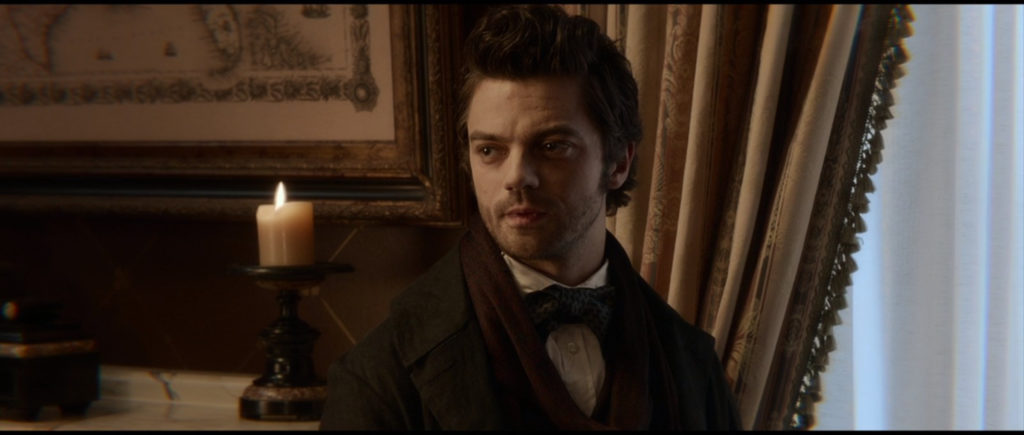
*Now there’s a dashing Willoughby. All three of us agreed that, on the whole, the men in Ang Lee’s 1995 film version were vastly superior to the men in the 2008 TV version—with one exception. I remember that we were all rather charmed by a pre-Downton Abbey Dan Stevens as Edward Ferrars.
**If you search Cooper’s name on Twitter, you will find many people who disagree with me on this. Maybe I just missed the point, but I’ve watched the “Lay All Your Love on Me” clip five times over the course of writing this piece and still don’t get it.
***I came to the musical first through the original cast recording (in high school, a friend burned me a copy—yes, I know, my theater kid is showing), but I did get to see the full show on stage when the Salt Lake Acting Company mounted it in 2012. I made my sister come with me, and they did not like it as much as I did, to put it mildly. Your own mileage may vary.
****2009 marked the bicentennial of Lincoln’s birth, and in the ensuing years several projects, both scholarly and popular, set out to capitalize on the small flurry of renewed interest in the man and his historical legacy. Grahame-Smith’s novel was published in 2010, hot on the heels of the bicentennial. In 2012, Abraham Lincoln: Vampire Hunter famously wasn’t the only Lincoln-related film release. That fall, Steven Spielberg’s Lincoln, for which Daniel Day-Lewis won the Best Actor Oscar, came out to almost universal acclaim.